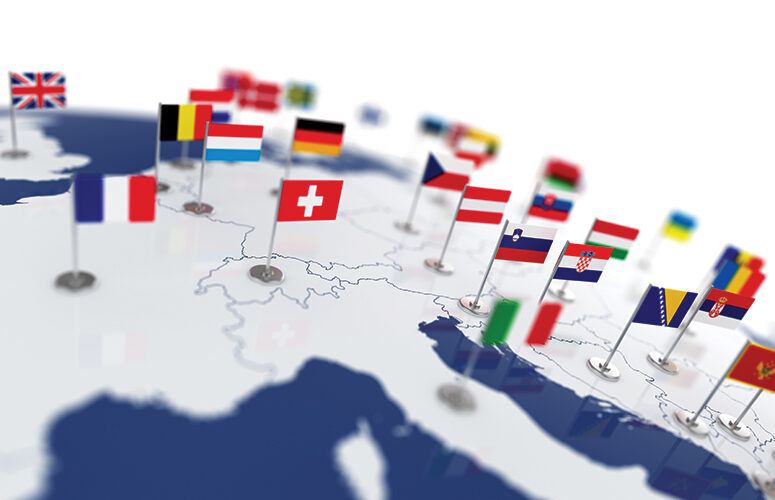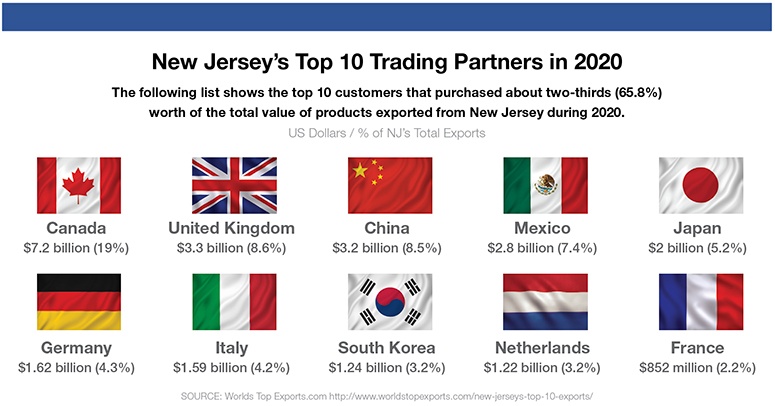
Going International: Small & Mid-sized Businesses Face Unforeseen Challenges
Even if you’re just conducting business with a single company overseas, you’ll need legal help to avoid the pitfalls.
By Joe Cavaluzzi, Contributing Writer On May 7, 2021International trade offers great opportunities for small and mid-sized businesses, but tapping those markets can present numerous hurdles, including tariffs, labor laws, accounting rules, insurance liabilities, and privacy protection. Just defining the market and identifying potential customers can be daunting.
Lots of Potential
Not knowing what you don’t know can kill your plans. That’s where law firms that offer an array of specialty practices can make the difference between success and failure.
But the potential in international trade is great: New Jersey’s top five exports – some of which you may never have heard of – generate nearly $8 billion in sales a year. Palladium, a metal used in fuel cells to power a host of things including cars and buses, is the leader at $2.7 billion and accounts for 7.1% of the state’s exports. It is followed by Rhodium, $2.5 billion, 6.6%; Precious metal waste, scrap, $1.1 billion, 2.9%; Cell phones, $927 million, 2.4%; and Platinum waste, scrap, $836 million, 2.2%.
The state’s top trading partners – Canada, the United Kingdom, China, Mexico and Japan – span three continents, and all of them have laws that can be vexing to the uninitiated.
Identifying the Pitfalls
“The initial analysis we perform is to help clients identify their goals and assist them in articulating how they will attempt to accomplish those goals,” says John Cromie, chair of the Corporate and Business Law Group at Connell Foley in Roseland. “There are various ways we can do that. One way is to look for a joint venture strategic partner in the territory the client is interested in. Another is to start a new division of the company to handle the overseas business.”
Sometimes, it’s as simple as hiring a marketing person to help drive revenue in the territory, making sure it’s going to work before clients take on a lot of costs.
“It depends on where the client is in its own business cycle. How well established are they? Are they already doing business in the area or are they going out and prospecting?” Cromie asks, adding that the most common challenge often occurs before even trying to enter a new country. “The most common pitfall is when the initial goal of driving revenue is based on incomplete assumptions.”
Other challenges include keeping up with the constraints and legal requirements of trade agreements, such as the US Mexico Canada Trade Agreement (USMCA), which replaced NAFTA last summer. Clients have to be sensitive to taxes, and – in particular – transfer pricing policies, which are highly specialized. “Companies in partnering countries don’t want to have unwanted surprises about exposing their worldwide revenues to the US tax propagation,” Cromie says.
Robert C. Gabrielski, chair of Norris McLaughlin’s International Business and Tax Planning Group, notes that while overseas opportunities abound, governments have begun to impose regulations aimed at protecting personal information.
“As we all live in the era of ‘big data’ collection, whether on the internet or otherwise, governments have developed more robust practices to protect consumer information. The EU’s General Data Protection Regulation (“GDPR”), which became effective in 2018, has one of the toughest global privacy and security laws,” Gabrielski says. “The GDPR imposes obligations on organizations and businesses anywhere in the world, so long as those organizations and businesses collect data related to people in the EU. Moreover, the GDPR requires that entities controlling that data must be able to demonstrate, at any given time, that they are GDPR compliant.”
Choosing the Right Firm
A New Jersey-based law firm with the right specialty areas will be able to offer advice on tax and corporate structuring, employment relations, exposure to product liability, contract negotiations, and real estate leases or acquisitions, including environmental aspects,” says Peter Flagel, director of the Corporate Group at Gibbons Law.
“A firm like Gibbons can help in all of these areas, adding the additional competitive advantage,” Flagel says. “Maybe the clearest example is product liability: Product liability is often not a major cost concern in many European countries, and it is easily insured.” Product liability risks can be a driving force in the decision whether to bring a product to market. “We can advise on product liability risks and develop strategies to keep such risks at a minimum,” he says.
Large firms such as Gibbons also offer the benefit of contact with accounting firms that can help with tax structuring, tax filing obligations, and for smaller firms, maintaining all accounting records and payroll.
Cromie says his firm often turns to its “partners” in the USLAW Network, Inc., which has lawyer members spread throughout Canada, Mexico and South America. Through the USLAW Network, members of the Trans European Law Firm Alliance (TELFA) in the UK can also be of assistance.
“When I pick up the phone, 99% of the time they can help,” Cromie says. “Also, if it’s something very esoteric, typically someone in the firm knows someone with that specific expertise. So, the client is not going in cold.”
The COVID-19 Plunge
The pandemic hit international business hard.
“Shipping times have multiplied, international business travel has come to a standstill, and the uncertainties, at least for small to mid-sized corporate cross-border transactions, have been put on hold,” Flagel says.
Raymond G. Lahoud, chair of Norris McLaughlin’s Immigration Law Practice Group, notes that the COVID-19 pandemic has demonstrated the volatility of international trade. China, New Jersey’s third largest trading partner, saw monthly exports drop from $190 billion in January 2020, to approximately $70 billion in February 2020, only to return to pre-pandemic levels by last June. The US had similar export declines, from $135 billion to about $90 billion between April and May of last year.
Although the final chapter on the pandemic and international trade has yet to be written, says Cromie, it certainly has accelerated a shift of working with clients over the internet.
“However, we’re also going to look back on how it fostered new ways of doing business and the focus on service,” he says. “People focused on growing their business are focused on serving their clients. That means taking calls at 9:30 pm on a Friday night. You can’t wait for FedEx anymore for documents, you’re getting them real time.”
To access more business news, visit NJB News Now.
Related Articles:






